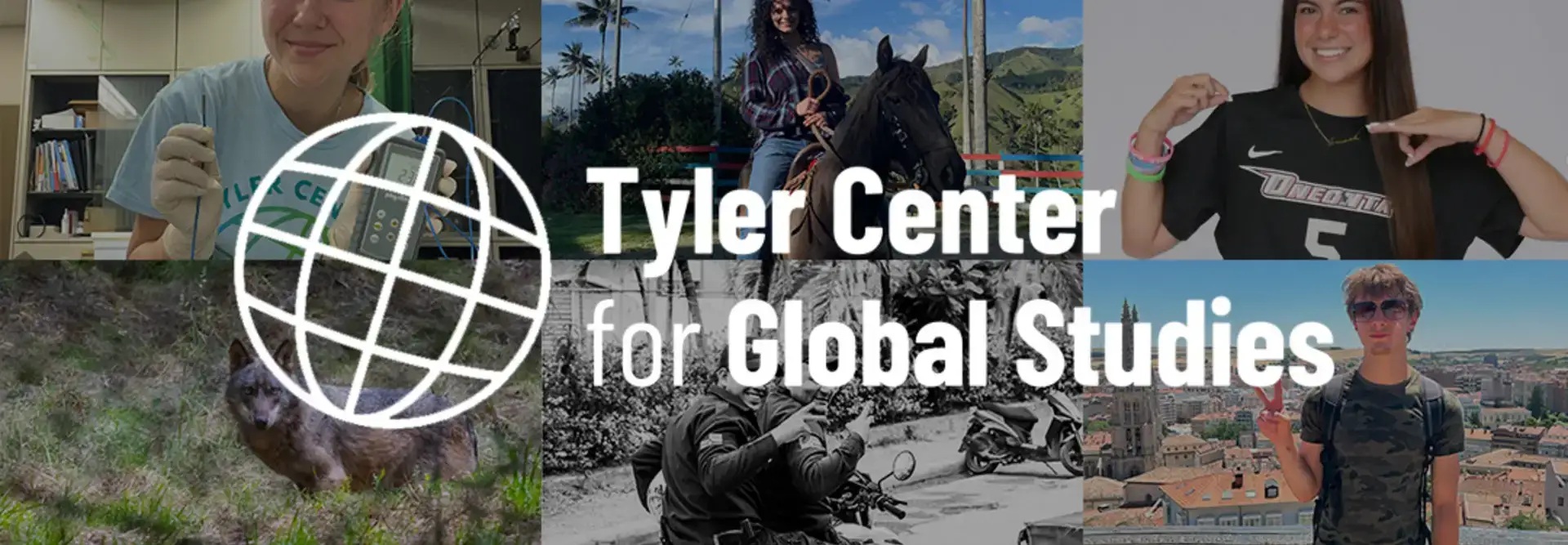Six SUNY Oneonta students were immersed in hands-on, grant-funded learning experiences abroad this summer in subjects ranging from biology to music under the guidance of faculty mentors.
The trips were made possible by the Tyler Center for Global Studies, which awarded a $20,000 grant to SUNY Oneonta to fund student international research and creative activities. SUNY Oneonta was among 12 universities across the country to be selected by the Tyler Center for Global Studies. SUNY Oneonta opened applications to all students and selected a cohort of six students as its first class of Tyler Fellows.
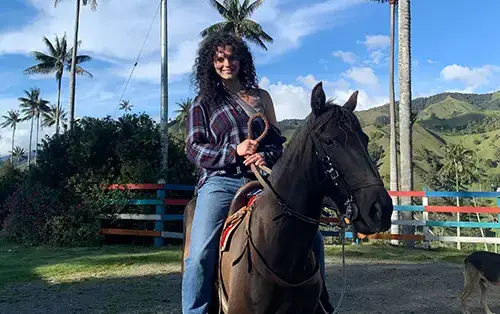
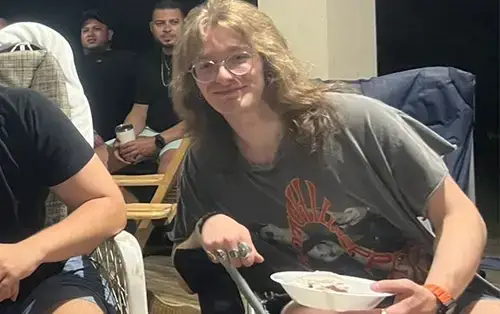
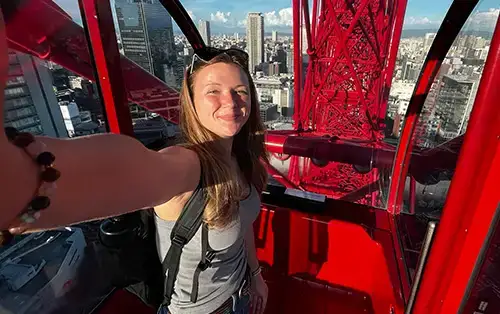
Each student chose a different destination, spending just under a week to more than a month engaged in their project. Among their SUNY Oneonta faculty mentors were Assistant Professor of Photography Wesley Bernard, Associate Professor of Spanish Maria Cristina Montoya, Associate Professor of Music Adam Kent and Associate Professor of Biology Kiyoko Yokota.
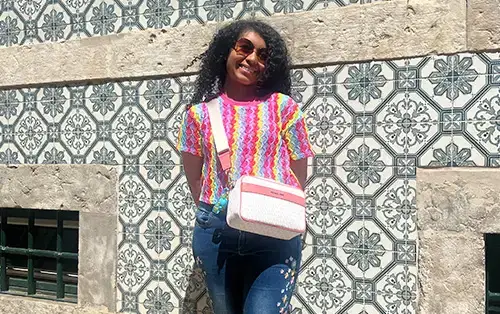
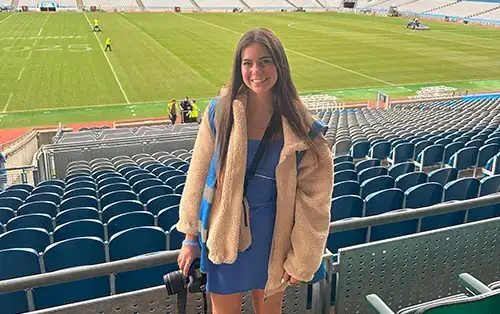
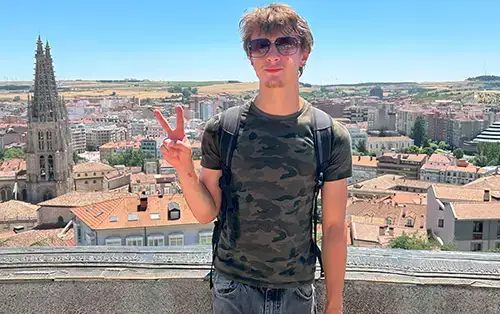
Two of the students who completed research abroad were Hannah McNally (’26) and Magnus Chenel (’26). McNally, a Digital and Studio Art major, traveled to Ireland for her project “Chasing the Curse,” where she spoke with locals about the curse of County Mayo's Gaelic football team. The team is believed to be under a hex that prevents them from winning an All-Ireland championship following their 1951 victory, a feat that has persisted despite 10 subsequent losses in the finals.
Dr. Kent and Chenel, a Music Industry Major, were the only faculty-student pair who traveled together, venturing to Spain for Chenel’s project, “Música Española: Bridging the Gap Between Folk and Art Music in Spain.”
“I was so grateful for my student Magnus to receive support from the Tyler Fellowship Program to attend the Burgos International Music Festival in Spain,” said Dr. Kent. “This opportunity to travel and study provided Magnus with several indispensable experiences: Immersion in another culture and language, where he was able literally walk through hundreds of years of history in the old quarter of Burgos; The challenge of an international music program, with students and faculty from around the world, daily concerts, numerous performance opportunities and chances to collaborate.
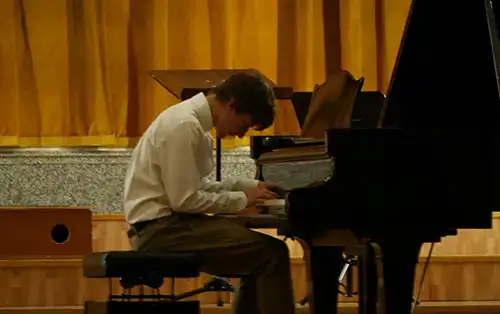
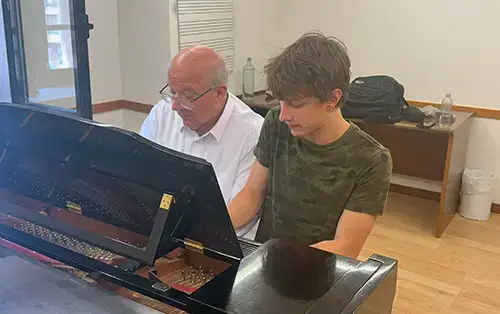
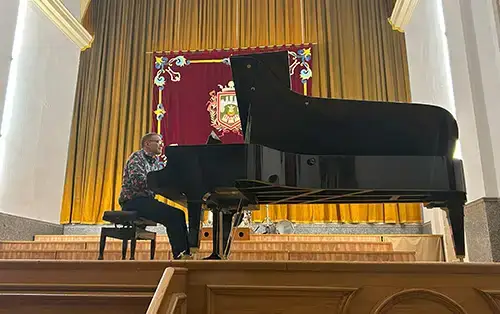
“Magnus was also enlisted as a stage manager, something that ties in well with his goals as a Music Industry major; A nexus between travel and scholarship, enabling Magnus to study the music of Spain in special workshops I run at the festival, which culminated in a concert of Hispanic music by festival students.”
Now back on campus, students have been working on personal reflections about their travels and projects, networking with their peers in the program and will participate in a virtual Tyler Fellowship conference on Nov. 20. All six Tyler Fellows are also presenting their research during the Student Research and Creative Activity Summer Showcase on campus in the Hunt Union International Lounge from Sept. 22-25, with in-person sessions set for Sept. 23 from 9-11 a.m. and 1-3 p.m.
Conducting Molecular Biology and Neuroscience Research in Japan
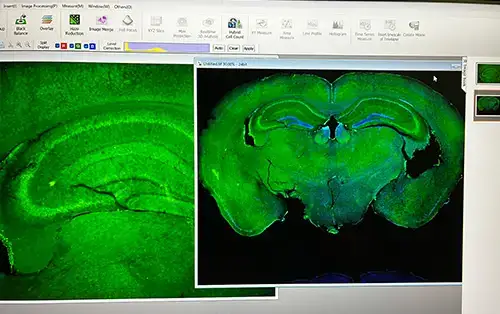
Ellie Vogl, a senior majoring in Biology under Dr. Yokota’s mentorship, went to Japan for her project titled “Evaluating the Role of MARK4 in Lipopolysaccharide-Induced Responses in Mice.” Working in Tokyo Metropolitan University’s (TMU) molecular biology and neuroscience labs, she designed and carried out an experiment testing whether the absence of a regulatory protein called MARK4 influenced how lab mice responded to injections of lipopolysaccharide (LPS), a substance that induces sickness behaviors and neuroinflammation in the brain.
Over three weeks of trials, Vogl measured the mice’s body weight, temperature, food intake and performance on behavioral tests such as the Open Field, Splash, Forced Swim and Social Interaction tests. She also performed dissections to collect brain tissue for microscopy. With guidance from a doctoral student, she learned advanced lab techniques like brain slicing, immunostaining and fluorescent microscopy.
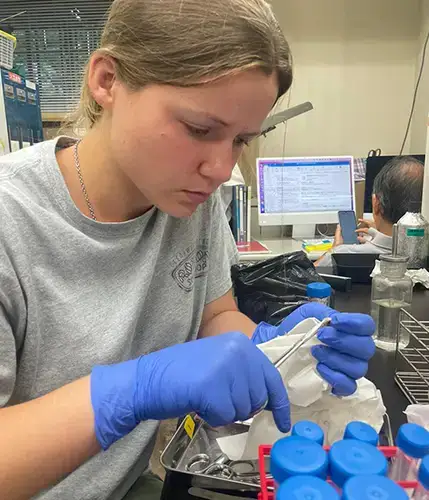
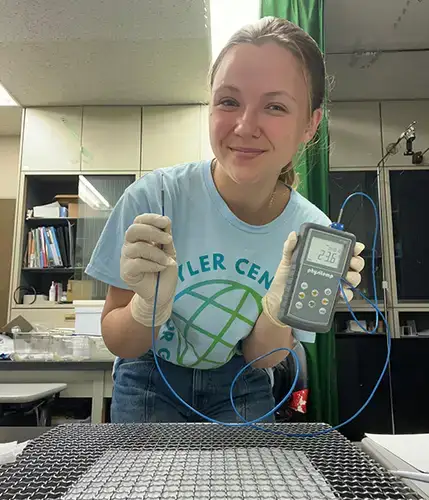
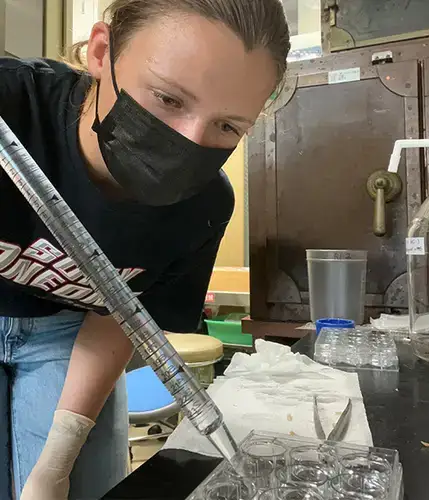
“At the end of my internship at TMU, I analyzed the data I had collected and made a series of graphs to present,” said Vogl. “From this, I gained presentation experience and received feedback on my graphs and data to be used when presenting this fall.”
Outside the lab, she embraced Japanese culture, traveling to Tokyo, Kyoto, Osaka and Nara, where she explored temples, shrines and even hiked Mt. Takao.
This internship allowed me to conduct research and gain technical skills in a foreign country,”
“This internship allowed me to conduct research and gain technical skills in a foreign country,” said Vogl. “It widened my global perspective, challenged me to navigate another country on my own and taught me about Japanese culture through immersion.”
Coastal Community Interviews in the Dominican Republic
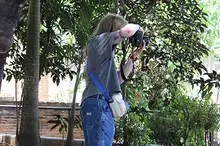
Sean Eaves, a senior majoring in Art and Design with a concentration in photography, traveled to the Dominican Republic for his project, “Echoes of the Future: A Photo Essay of the Dominican Republic Coastal Community Project,” under Bernard’s guidance. During his week-long trip, Eaves immersed himself in the country’s vibrant culture, experiencing fresh local cuisine, distinctive architecture, lively music and dance and the renowned hospitality of Dominican communities.
As part of his project, Eaves photographed a wide range of subjects, from grand cathedrals to roaming cats and dogs, and conducted more than half a dozen interviews with locals about their daily lives. Many of the people he spoke with relied heavily on tourism for income, providing him with a unique perspective on the economic and cultural dynamics of coastal communities.

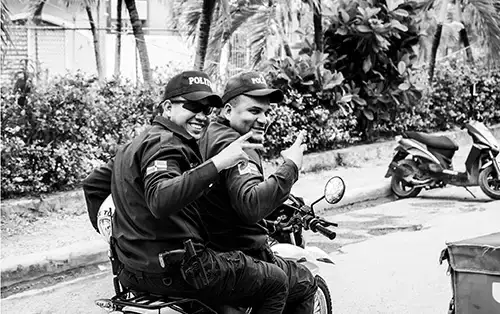
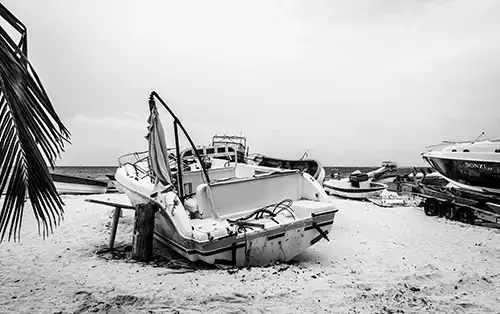
It was really eye-opening to the fact that interviewing people is harder than people make it out to be.”
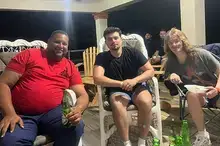
“I really have always wanted to try journalism, but never really had the opportunity,” said Eaves. “This was a great one to go and do for it. It was really eye-opening to the fact that interviewing people is harder than people make it out to be.”
With the assistance of a bilingual friend for translations, he was able to carry out in-depth interviews.
“There were definitely barriers I had to get across, but I think that added to the learning experience,” said Eaves. “If I ever go anywhere else, I might have the same problems, but now I have ways to combat issues.”
Wolf Wildlife Sanctuary and Conservation in Portugal
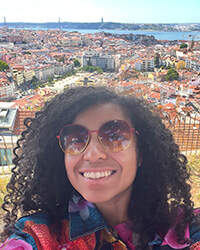
Bernard was also the faculty mentor for Nadia Anchundia, a senior majoring in Digital and Studio Art, who spent two weeks in Portugal engaging in an immersive wolf conservation project, titled “Understanding Conservation Efforts for Wolves Worldwide.” She stayed at a sustainability-focused hostel and connected with travelers from around the world, gaining insight into global perspectives on conservation and community engagement.
At a wolf sanctuary in Mafra, nestled in the Portuguese countryside, Anchundia worked closely with staff to care for Iberian wolves. She participated in daily tasks such as maintaining enclosures, preparing food and supporting volunteer activities, all while photographing the wolves for her project. Guided by sanctuary staff, she learned to document the animals respectfully, capturing their natural behaviors and the sanctuary’s efforts to protect wolves that cannot survive in the wild.
It was so hard for me in the beginning to get a good photo of them, but I took so many in the end."
“Wolves have a very keen sense of smell, so they were definitely questioning who I was,” said Anchundia. “It was so hard for me in the beginning to get a good photo of them, but I took so many in the end. I was like “Oh, thank goodness,” because I didn’t want to scare or stress them out. I care about these animals.”
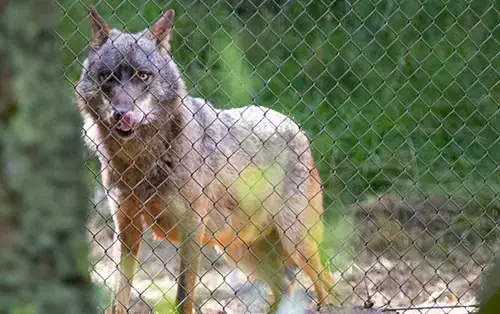
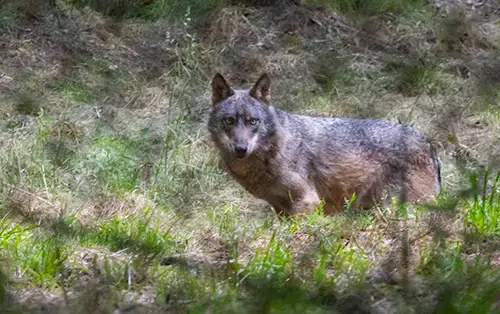
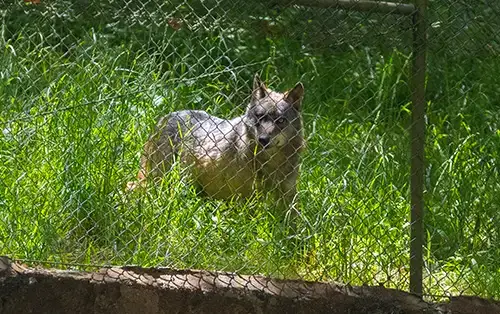
Anchundia also found time to explore Lisbon’s vibrant culture, visiting beaches, the Tile Museum and experiencing local music and architecture. She also connected with fellow volunteer students and international travelers, broadening her perspective on cultural diversity and conservation practices.
Exploring the Tango Community and Culture of Colombia
Spending nine days in Colombia for her project “Dancing for Good Health and Wellbeing (SDG 3),” Ali Krebs, a senior majoring in Exercise Science, studied how the tango and other forms of dance support health, social connection and cultural identity. With faculty mentorship from Montoya, her research focused on the tango community in Manizales.
Krebs interviewed dancers to understand how the dance influenced their lives. Many, particularly retired women, shared that tango was not only a form of exercise but also a way to socialize and maintain emotional well-being. Krebs saw how dance intertwined with everyday life and cultural traditions, even as younger generations leaned more toward salsa and bachata.

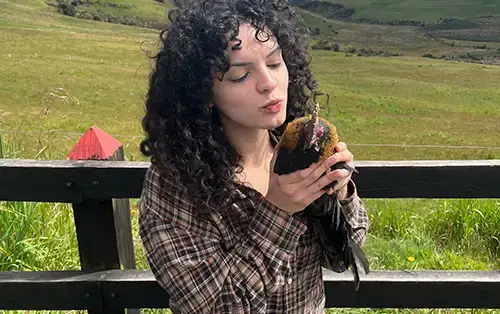
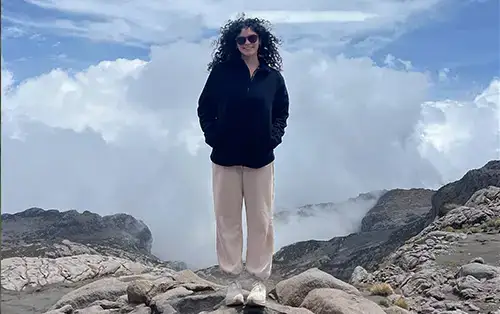
This trip showed me how much there is to learn outside the classroom, through culture, conversation,"
“I realized that for many people, tango isn’t just about movement. It’s about community, connection, and feeling good in mind and body,” said Krebs. “This trip showed me how much there is to learn outside the classroom, through culture, conversation and simply being present in a new place.”
Krebs also traveled through Bogotá, Pereira and Salento, taking in Colombia’s breathtaking mountain landscapes on horseback and visiting cacao and coffee farms to see firsthand how two of the country’s most famous exports are cultivated. Along the way, she connected with Colombian university students who helped with translation and shared insights into daily life in the country.
